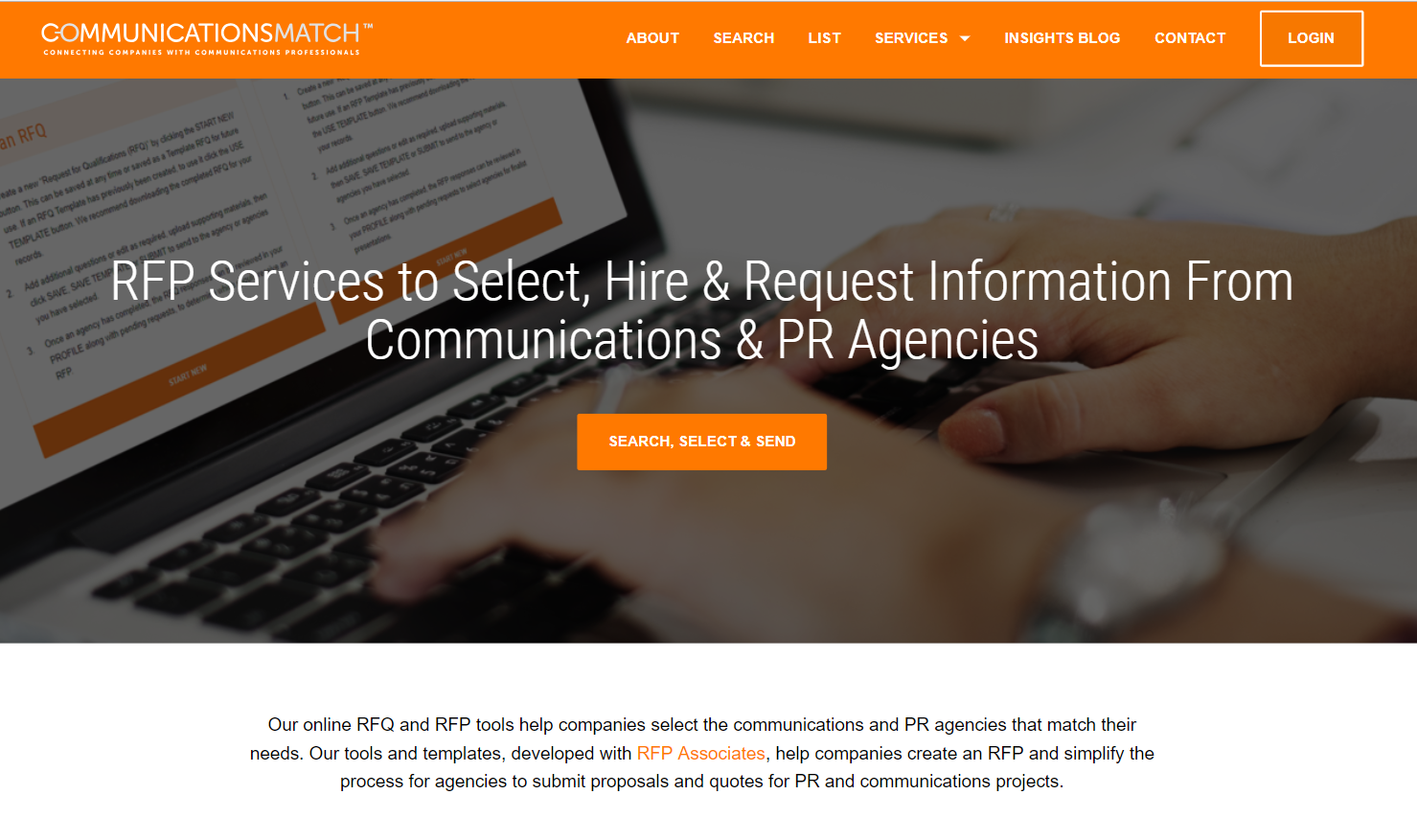Public Relations RFPs: How to Improve the Agency RFP Process

Agencies hate requests for proposals (RFPs). But for companies/clients, they are an important and very necessary – although often labor-intensive – step in the process of selecting agencies for agency-of-record assignments or projects.
You don’t need us to point out the conflict.
It’s important to ask how we got to this point, and how we can move beyond it. As we argue here and in a new article for CommPRO.biz "PR RFPs: How to Fix a Broken Process", reinventing the PR and communications agency RFP is necessary to find common ground, and to return to a situation in which RFPs are viewed as fair, well-respected and worth responding to.
Why Do Agencies Hate the RFP Process?
We’ve heard a lot of colorful and even off-color language about this, but it tends to boil down to five main reasons:
1. Agencies would rather win business in the simplest way possible
Clearly, it’s ideal to have a client say, “You have a great reputation and I want you to manage my public relations, communications or digital marketing program!” Agencies with strong word-of-mouth recommendations and charismatic leaders often win business this way. If projects come to agencies, why would they spend the time to complete an RFP?
2. The RFP process is a lottery
It asks an agency to take the time to complete the process knowing it may not win. Agency leaders need to decide – do I want to allocate billable time and effort to provide the requested information with an uncertain outcome?
3. RFPs are rigged
Agencies are jaded when it comes to RFPs. Not because they didn’t win a pitch on their merits, but because all too often they believe the RFP process is rigged in favor of incumbents, is an exercise in going through the motions of an agency search when the result has already been decided, or a client merely wants to steal its ideas.
4. Communications RFPs may be issued using templates that were not designed for hiring an agency
As a result, the process may require information that isn’t relevant or not include critical information that is. And, completing the documentation may take far more effort and time than should be necessary.
5. Publicly posted RFPs aren’t worth the effort
Many agencies have found that public RFPs are rarely worth the time spent to complete them – unless you have an inside track.
Client-Issued RFPs
We’ve never met a CCO or CEO who was truly excited about an RFP process to identify and hire a new PR agency. Most would rather trust their instincts and sign an agency they know or has been recommended. Unfortunately, hiring any firm based on previous work or a recommendation misses out on the benefits of developing a clear scope of work and set of measurement objectives from a disciplined agency search process.
It is important to make the point here that companies/clients need to allocate to agency searches the same time and focus they would bring to hiring a new employee. But, when bandwidth is limited, agencies tend to all look the same. And, when a company is looking for the quickest possible on-ramp for getting an agency onboard, shortcuts become very attractive. We believe there’s a lot of lost opportunity from not taking the time to identify and engage the best possible communications partner.
Public PR RFPs
There’s an additional dimension to PR RFPs that muddies the waters: Government, association, and company RFPs that are publicly posted.
Making an RFP public provides transparency, but creates a new set of challenges for agencies and the issuer. For agencies, responding to a public RFP – unless they are uniquely qualified for the assignment – is likely to be an exercise in futility, especially when the issuer already has specific agencies in mind. And, for the organization or company, the potential downside is that it is likely to be overwhelmed with responses from agencies and consultants.
Reinventing the RFP Process for Better Search Outcomes
Most would acknowledge that the agency RFP process is broken, despite its importance to companies and its usefulness in achieving better search outcomes.
![]()
We believe a fix requires four things:
- A simpler, more efficient approach to creating and issuing agency RFPs and RFQs (Requests for Qualifications).
- RFPs that are comprehensive, yet customized and structured on a client-specific basis to give candidate agencies the information they need to inform their responses/proposals.
- Confidentiality and propriety information protection for both sides through a required non-disclosure agreement. This will protect the client from having its information distributed, and the agencies from providing strategy and creativity that it feels may be taken.
- A commitment to ensuring a level playing field for all candidate agencies invited to participate and a structured/objective way to evaluate and review incoming proposals.
RFPs & Agency Search: A Technology-Driven Approach
Where there’s a choice, RFPs should be issued to agencies or consultants following a comprehensive search to identify those with the industry and communications expertise that match the needs of a specific assignment. Whether a client uses the CommunicationsMatch™ agency search platform to find agencies or uses consulting services to develop a shortlist for an assignment, RFQs and RFPs must be issued with intent by companies or organizations.
Watch this video from our Agency Search Series on RFQs.
RFPs for Communications Agencies
RFPs must also be well-constructed. They need to have a clearly defined budget and focus on what’s important. In other words, they need to be structured for the communications industry – not be a variation of an RFP for purchasing a new phone system.
Watch this video in our Agency Search Series on RFPs.
The customizable online agency RFP platform within CommunicationsMatch incorporates the search expertise of RFP Associates and enables clients/companies to develop RFQs and RFPs tailored to each project.
Streamlining Agency RFPs
A streamlined RFP process ensures RFPs are issued with intent, and provides companies with the information they need to select finalists for presentations. As we outline in our “A Client’s Guide to PR and Communications Agency Search”, search and RFP technology help companies more quickly get to the qualitative part of the search process to ask questions and check for chemistry and organizational fit.
The Benefits of PR RFPs
Leading and managing an effective RFP process is the key to changing mindsets about this important tool, and to improving agency search outcomes.
When RFPs are combined with a more comprehensive and transparent search process, both companies and agencies benefit. Companies have the opportunity to access the best talent available, quickly and efficiently, rather than be limited by word-of-mouth recommendations. At the same time, agencies are positioned to benefit from new business opportunities that are aligned with their expertise and skillsets.
Find out more about the CommunicationsMatch and RFP Associates RFP tools.

About the Authors
Simon Erskine Locke, Founder & CEO, CommunicationsMatch™
Locke developed and launched CommunicationsMatch, an agency search and engagement platform with 5,000 listed firms and professionals in 12 countries, to help companies find and engage agencies, consultants and freelancers that match needs. A founder of communications agencies and startups, he previously headed communications functions at Prudential Financial, Morgan Stanley and Deutsche Bank.
Steve Drake and Robert Udowitz founded RFP Associates in 2011 after observing the agency selection process from “both sides of the aisle” and recognizing the need to streamline and improve the way searches are made and agencies selected from an honest, unbiased approach. Over the course of their careers Robert and Steve have worked at agencies, corporations, and trade associations in New York, Washington, and, for Steve, in Beijing, China, where he opened Fleishman-Hillard's first Asian office. In recent years they have also been sole practitioners for a variety of clients seeking media, crisis, and strategic counsel.
